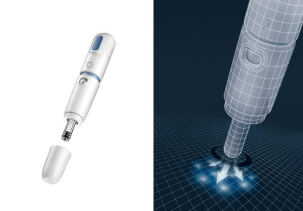Diabetes mellitus, a chronic metabolic disorder, affects millions worldwide and requires continuous management to prevent complications. One crucial advancement in diabetes treatment is the use of incretin-based therapies, such as GLP-1 receptor agonists, which improve blood sugar control. However, the traditional delivery method via needle injections poses challenges for many patients. The development of needle-free injectors offers a promising solution, enhancing patient compliance and comfort while maintaining
effective therapy delivery.
The Role of Incretins in Diabetes Management
Incretins are hormones that play a vital role in regulating glucose metabolism. The two primary incretins, glucagon-like peptide-1 (GLP1) and glucose-dependent insulinotropic polypeptide (GIP), enhance insulin secretion in response to meals, suppress glucagon release, and slow gastric emptying. GLP-1 receptor agonists, such as exenatide and liraglutide, have become popular in managing type 2 diabetes due to their ability to lower blood glucose levels and promote weight loss.
Limitations of Traditional Needle Injections
Despite the efficacy of GLP-1 receptor agonists, their administration via needle injections presents several drawbacks:
Pain and Discomfort: Frequent needle injections can cause pain and discomfort, leading to reduced adherence to therapy.
Needle Phobia: Many patients experience needle phobia, which can deter them from initiating or continuing treatment.
Risk of Infection: Improper injection techniques can increase the risk of infections and other complications at the injection site.
Storage and Disposal: Managing needles and ensuring proper disposal is an added burden for patients.
Advancements in Needle-Free Injector Technology
Needle-free injectors (NFIs) represent a significant advancement in drug delivery systems, addressing the limitations of traditional needle injections. These devices deliver medication through the skin using a high-pressure stream, eliminating the need for needles. Several types of needle-free injectors have been developed, including:
Spring-Loaded NFIs: These devices use a spring mechanism to generate the required pressure for drug delivery. They are simple to use and provide consistent dosing.
Gas-Powered NFIs: These injectors utilize compressed gas, such as carbon dioxide or nitrogen, to propel the medication through the skin.
Electromechanical NFIs: These advanced devices use an electric motor to achieve precise control over the injection pressure and dose.
Benefits of Needle-Free Injectors for Incretin Therapy The adoption of needle-free injectors for incretin therapy offers several benefits:

Enhanced Patient Compliance: The pain-free and needle-free nature of NFIs encourages patients to adhere to their therapy regimen.
Improved Safety: NFIs reduce the risk of needlestick injuries and infections associated with traditional needle injections.
Convenience: Needle-free injectors are often easier to use and manage, reducing the burden on patients and caregivers.
Potential for Broader Acceptance: Patients who are averse to needles are more likely to accept and continue incretin therapy with NFIs.
Challenges and Future Directions
While needle-free injectors present numerous advantages, their development and widespread adoption face several challenges:
Cost: The initial cost of NFIs may be higher than traditional needle syringes, although this may be offset by improved adherence and outcomes.
Technical Barriers: Ensuring consistent drug delivery and overcoming technical challenges related to injector design are crucial for efficacy.
Patient Education: Educating patients and healthcare providers about the proper use of NFIs is essential for successful implementation. The development of needle-free injectors for incretin therapy marks a significant dvancement in diabetes management. By addressing the limitations of traditional needle injections, NFIs enhance patient compliance, safety, and overall treatment experience. As technology continues to evolve, needle-free injectors hold the promise of becoming a standard in diabetes care, improving the lives of millions living with this chronic condition.
Post time: Jul-13-2024
